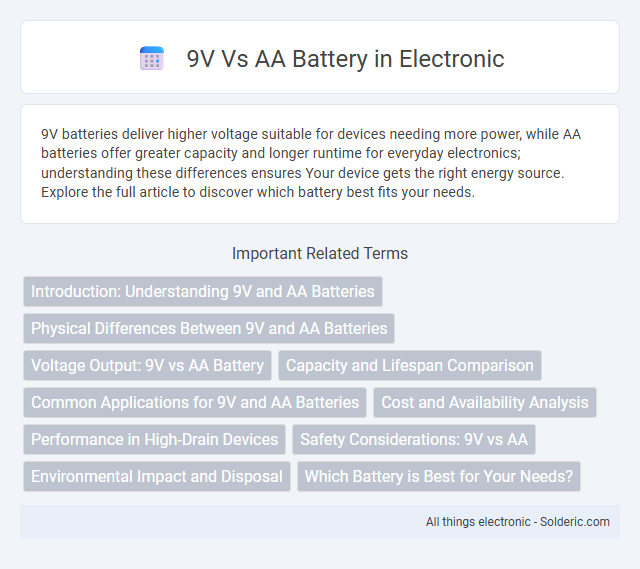9V batteries deliver higher voltage suitable for devices needing more power, while AA batteries offer greater capacity and longer runtime for everyday electronics; understanding these differences ensures Your device gets the right energy source. Explore the full article to discover which battery best fits your needs.
Comparison Table
| Feature | 9V Battery | AA Battery |
|---|---|---|
| Voltage | 9 Volts | 1.5 Volts |
| Size (Dimensions) | 26.5 x 17.5 x 48.5 mm | 14.5 x 50.5 mm |
| Capacity (mAh) | Typically 500-600 mAh | Typically 1800-3000 mAh |
| Weight | Approx. 45 grams | Approx. 23 grams |
| Common Uses | Smoke detectors, microphones, wireless transmitters | Remote controls, toys, clocks, cameras |
| Rechargeable Options | NiMH and Li-ion 9V available | NiMH, Li-ion widely available |
| Price Range | Higher per unit cost | Lower per unit cost |
Introduction: Understanding 9V and AA Batteries
9V and AA batteries serve different power requirements, with 9V batteries commonly used in devices needing higher voltage like smoke detectors and guitar pedals, while AA batteries are preferred for everyday electronics such as remote controls and flashlights due to their versatility and availability. The 9V battery typically provides a single 9-volt source through its rectangular shape, whereas AA batteries supply 1.5 volts each in a cylindrical form and are often used in multiples to achieve desired voltage. Choosing between these battery types depends on your device's power needs, size constraints, and energy consumption patterns.
Physical Differences Between 9V and AA Batteries
9V batteries are rectangular and compact, measuring approximately 48 mm in height, 26 mm in width, and 17 mm in depth, whereas AA batteries are cylindrical with a length of about 50 mm and a diameter of 14 mm. The 9V battery features snap connectors on top, designed to connect two cells in series, while AA batteries have a flat negative end and a protruding positive terminal for individual use or in series configurations. These distinct shapes and terminal designs influence their compatibility with different electronic devices.
Voltage Output: 9V vs AA Battery
A 9V battery typically provides a steady voltage output of 9 volts, making it ideal for devices requiring higher voltage levels, whereas a standard AA battery delivers about 1.5 volts. When comparing voltage output, four AA batteries in series are needed to match the 6V output, still less than a 9V battery's capacity. Your choice depends on the voltage requirement of your device and the battery configuration needed to achieve optimal performance.
Capacity and Lifespan Comparison
A 9V battery typically offers a capacity of around 500-600mAh, whereas an AA battery provides a higher capacity ranging from 1500mAh to 3000mAh depending on the chemical composition. The lifespan of AA batteries generally surpasses that of 9V batteries in high-drain devices due to their larger capacity and lower internal resistance. For applications requiring longer usage times and consistent power delivery, AA batteries are often preferred over 9V batteries.
Common Applications for 9V and AA Batteries
9V batteries are commonly used in smoke detectors, wireless microphones, and guitar pedals due to their compact size and higher voltage output. AA batteries power a wide range of devices including remote controls, flashlights, portable radios, and children's toys, providing versatility and easy availability. Understanding your device's power requirements ensures you select the appropriate battery for reliable performance.
Cost and Availability Analysis
AA batteries generally offer a lower cost per unit and are more widely available than 9V batteries, making them a budget-friendly choice for everyday devices. Retailers and online stores frequently stock AA batteries in bulk, ensuring easy and affordable access. Your decision between 9V and AA batteries should consider these factors, especially for applications requiring frequent replacements.
Performance in High-Drain Devices
9V batteries generally provide higher voltage output, making them suitable for specific high-drain devices like smoke detectors and certain wireless microphones, while AA batteries, typically 1.5 volts each, are more versatile and often preferred in high-drain gadgets such as digital cameras and portable gaming systems due to their higher current capacity. Lithium AA batteries deliver superior performance under heavy load conditions compared to alkaline 9V batteries, supporting longer run times and consistent power output. The choice between 9V and AA batteries in high-drain devices ultimately depends on the device's voltage requirements and current draw characteristics.
Safety Considerations: 9V vs AA
9V batteries generally pose a higher safety risk compared to AA batteries due to their higher voltage, which can cause short circuits and sparks if terminals come into contact with metal objects. AA batteries, often available in alkaline or rechargeable formats, have a lower voltage (1.5V per cell) and are less likely to cause overheating or leakage under normal usage. Your choice between 9V and AA should consider device requirements and storage safety to prevent potential hazards like explosions or fires.
Environmental Impact and Disposal
9V batteries generally contain more toxic heavy metals like cadmium or mercury, making their environmental impact more severe compared to AA batteries, which often use alkaline or lithium chemistries with fewer hazardous materials. Proper disposal of both battery types is crucial to prevent soil and water contamination, but 9V batteries require more careful handling due to their potentially harmful contents. You can reduce environmental harm by recycling batteries at designated collection points, ensuring safe processing and minimizing landfill waste.
Which Battery is Best for Your Needs?
Choosing between a 9V and AA battery depends on your device's power requirements and size constraints. 9V batteries provide higher voltage and are ideal for smoke detectors, radios, and certain medical devices, while AA batteries offer greater capacity and versatility for everyday electronics like remote controls and toys. Assessing your device's voltage needs and usage duration ensures you select the best battery to maximize performance and longevity.
9V vs AA battery Infographic

 solderic.com
solderic.com